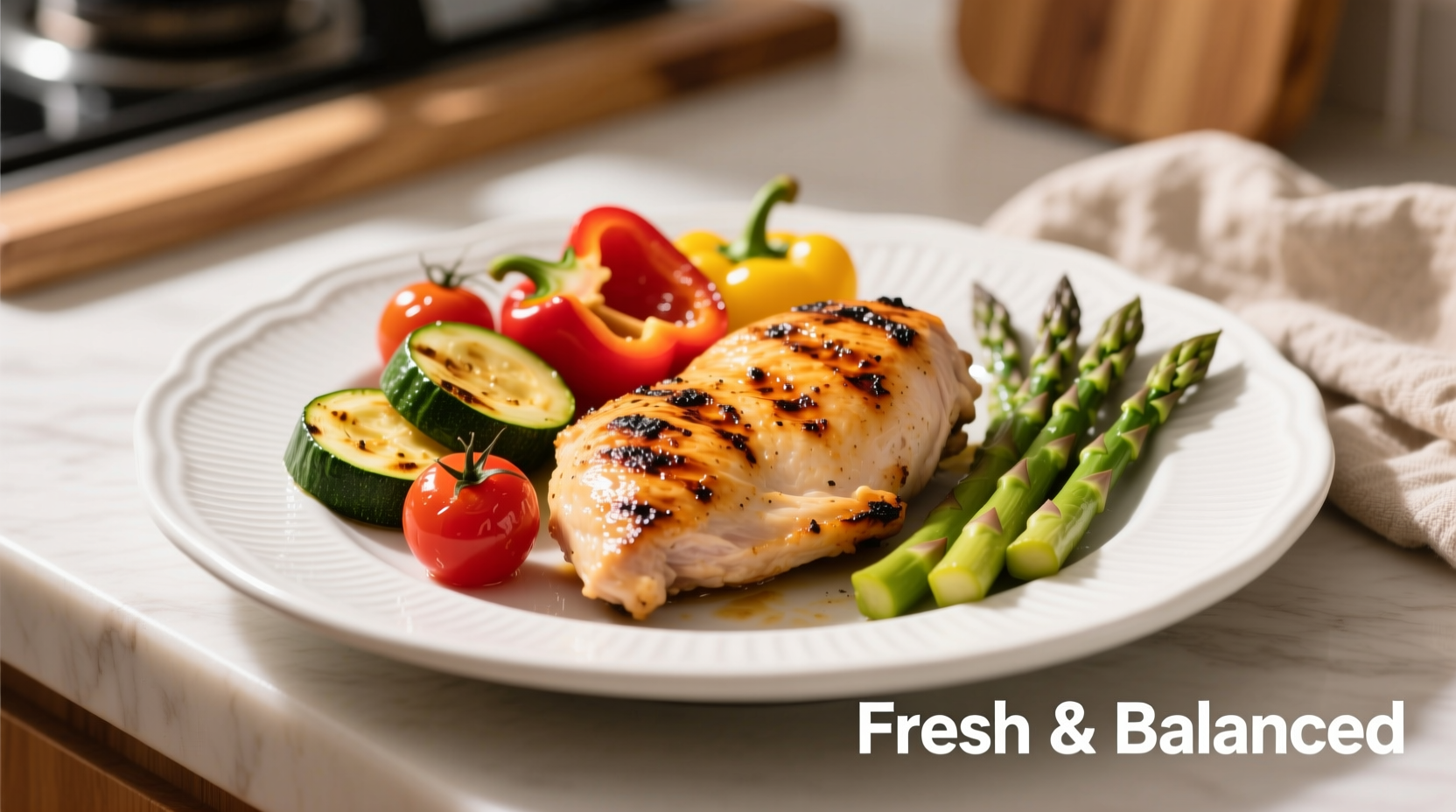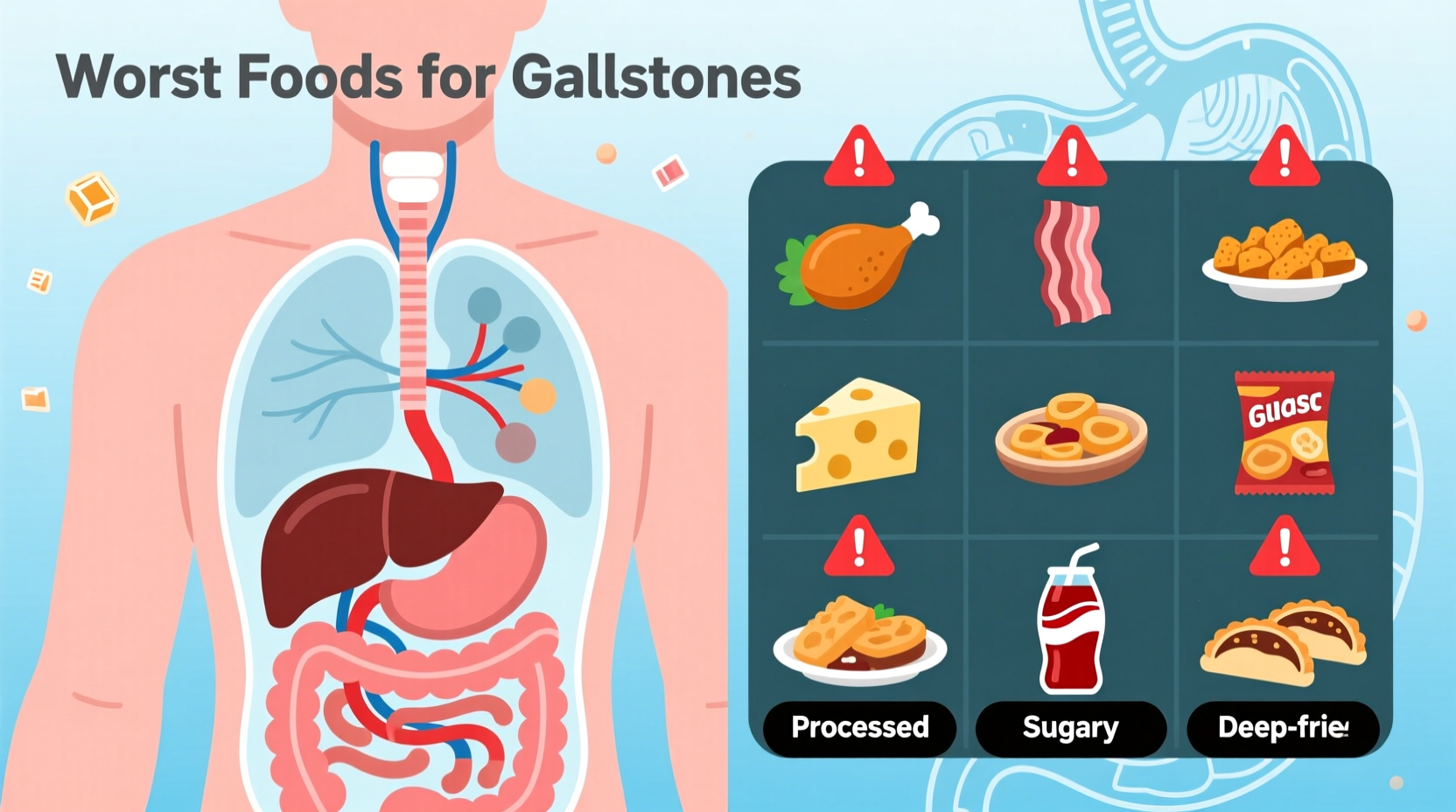If you're experiencing gallstone pain or have recently been diagnosed, understanding which foods trigger attacks is crucial for managing symptoms. This evidence-based guide identifies the specific foods that worsen gallstone symptoms, explains why they're problematic, and provides practical alternatives you can implement immediately.
| Food Category | Worst Offenders | Why Problematic | Severity Level |
|---|---|---|---|
| Fried & Fatty Foods | Fried chicken, french fries, bacon, sausage | Trigger intense gallbladder contractions | ★★★★★ |
| Full-Fat Dairy | Whole milk, cheese, ice cream | High saturated fat content | ★★★★☆ |
| Refined Carbs | White bread, pastries, sugary cereals | Contribute to cholesterol imbalance | ★★★☆☆ |
| Eggs | Egg yolks, omelets, quiches | High cholesterol content | ★★★☆☆ |
| Gas-Producing Vegetables | Broccoli, cabbage, onions | Indirectly worsen abdominal discomfort | ★★☆☆☆ |
How Diet Affects Gallstone Symptoms
Your gallbladder stores bile, which helps digest fats. When you consume high-fat foods, your gallbladder contracts forcefully to release bile into your digestive tract. If gallstones are present, this contraction can cause severe pain as stones temporarily block the ducts. According to the National Institute of Diabetes and Digestive and Kidney Diseases, dietary fat is the primary trigger for symptomatic gallstone attacks.
High-Fat Foods: The Primary Gallstone Triggers
Fried and fatty foods represent the most significant dietary risk for gallstone sufferers. These foods force your gallbladder to work harder, increasing the likelihood of painful contractions when stones are present.
Fried foods like french fries, fried chicken, and doughnuts contain unhealthy trans fats that dramatically increase gallbladder contraction. A study published in the American Journal of Gastroenterology found that regular consumption of fried foods increases the risk of symptomatic gallstones by 37% compared to minimal consumption.
Fatty meats including bacon, sausage, ribs, and processed deli meats contain high levels of saturated fats that trigger intense gallbladder activity. The American College of Gastroenterology specifically recommends limiting red meat consumption for those with gallstones.
Full-Fat Dairy Products: Hidden Gallstone Triggers
While dairy provides important nutrients, full-fat varieties can trigger gallstone symptoms. Whole milk, cheese, butter, and ice cream contain significant amounts of saturated fat that stimulate gallbladder contractions.
Research from the Nurses' Health Study, which followed over 60,000 women for 16 years, found that those consuming the highest amounts of saturated fat had a 25% higher risk of developing symptomatic gallstones compared to those with the lowest intake. The study specifically identified whole milk and cheese as significant contributors.
Refined Carbohydrates and Sugars: The Unexpected Culprit
While fat gets most of the attention, refined carbohydrates and sugars also contribute to gallstone problems. White bread, pastries, sugary cereals, and candy can worsen symptoms through different mechanisms.
These foods cause rapid blood sugar spikes followed by crashes, which can lead to overeating and weight fluctuations—both risk factors for gallstone formation and symptoms. Additionally, excessive sugar consumption may contribute to cholesterol imbalance in bile, promoting stone formation.
Eggs: Proceed with Caution
Eggs, particularly the yolks, contain high levels of cholesterol—nearly 200mg per large egg. For people with cholesterol-based gallstones (which account for about 80% of cases), this can be problematic.
The Mayo Clinic recommends limiting egg yolks to no more than two per week for those with gallstones. Egg whites, however, remain a safe protein source as they contain no fat or cholesterol.
Gas-Producing Foods: Indirect Contributors
While not direct triggers like high-fat foods, certain vegetables can worsen discomfort for people with gallstones. Broccoli, cauliflower, cabbage, onions, and beans produce gas during digestion, which can increase abdominal pressure and discomfort when gallbladder inflammation is present.
It's important to note that these foods remain nutritious and shouldn't be eliminated long-term. Instead, introduce them gradually after acute symptoms subside, and monitor your tolerance.
Practical Dietary Alternatives
Transitioning to a gallstone-friendly diet doesn't mean sacrificing flavor or satisfaction. Here are evidence-based alternatives to problematic foods:
- Replace fried foods with baked, grilled, or steamed options
- Choose lean proteins like skinless chicken breast, fish, and legumes
- Switch to low-fat or fat-free dairy products
- Substitute whole grains for refined carbohydrates
- Use egg whites instead of whole eggs in recipes
A typical day might include oatmeal with berries for breakfast, a salad with grilled chicken and olive oil dressing for lunch, and baked salmon with roasted vegetables for dinner. This pattern provides adequate nutrition while minimizing gallbladder stress.

When to Seek Medical Attention
Dietary changes can significantly reduce symptoms, but they're not a substitute for medical care. Contact your healthcare provider immediately if you experience:
- Severe, unrelenting abdominal pain lasting more than 5 hours
- Fever or chills accompanying abdominal pain
- Yellowing of skin or eyes (jaundice)
- Nausea and vomiting that prevents keeping liquids down
These symptoms may indicate complications like infection or blocked ducts requiring prompt medical intervention.
Long-Term Management Strategies
While avoiding trigger foods provides immediate relief, long-term management requires a comprehensive approach. Gradual weight loss (if overweight) at a rate of 1-2 pounds per week can reduce gallstone risk, but rapid weight loss actually increases risk.
Regular physical activity—aim for 150 minutes of moderate exercise weekly—helps maintain healthy bile composition. The Nurses' Health Study found that women who walked briskly for two hours weekly reduced their risk of gallstone surgery by 25% compared to sedentary women.











 浙公网安备
33010002000092号
浙公网安备
33010002000092号 浙B2-20120091-4
浙B2-20120091-4